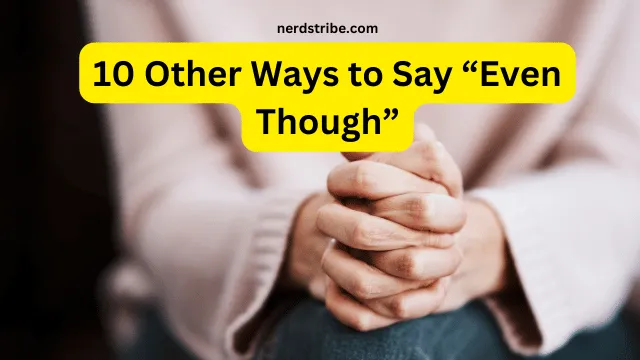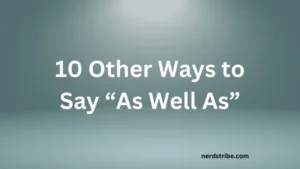Language is a powerful tool that enables us to express complex emotions, ideas, and relationships. “Even though” is one such versatile phrase that helps us communicate contrast or opposition in a sentence. It’s used to highlight how two ideas can coexist, despite their conflicting nature. But like any commonly used phrase, relying on it repeatedly can make our speech or writing feel predictable.
The beauty of language lies in its diversity. Finding alternative ways to express the same idea not only enriches your vocabulary but also makes your communication more engaging and precise. Whether you’re writing an essay, crafting a professional email, or having a casual conversation, using varied expressions can leave a lasting impact.
In this post, we’ll explore 10 creative alternatives to “even though” that can help you articulate contrast effectively. These phrases will not only broaden your linguistic horizons but also add depth to your expressions. Let’s dive in!

Contents
1. “Although”
A common yet elegant substitute for “even though.”
- Key Meaning: Indicates contrast or concession.
- Usage: Formal writing or speech.
- Example: “Although it was raining, we decided to go for a walk.”
- Why It’s Effective: It’s concise and works seamlessly in both spoken and written English.
2. “Though”
A more casual and flexible alternative.
- Key Meaning: Implies contrast but with a lighter tone.
- Usage: Everyday conversation or informal writing.
- Example: “He enjoyed the movie, though it was a bit too long.”
- Why It’s Effective: It adds a conversational flow to your statements.
3. “Despite the Fact That”
A formal and detailed option.
- Key Meaning: Emphasizes the opposing relationship between two ideas.
- Usage: Academic writing, professional emails.
- Example: “Despite the fact that she was late, she completed the project successfully.”
- Why It’s Effective: It adds clarity and weight to your sentences.
4. “While”
A simple and dual-purpose word.
- Key Meaning: Expresses contrast or simultaneous events.
- Usage: Suitable for both formal and informal contexts.
- Example: “While he disagreed with the decision, he respected it.”
- Why It’s Effective: It’s short, versatile, and widely understood.
5. “Even If”
A conditional yet contrasting phrase.
- Key Meaning: Suggests a hypothetical or contrary scenario.
- Usage: Informal discussions or speculative writing.
- Example: “Even if they don’t agree, we should proceed with our plan.”
- Why It’s Effective: It adds a dynamic and speculative tone.

6. “In Spite Of”
A phrase that feels assertive and direct.
- Key Meaning: Highlights persistence despite challenges.
- Usage: Ideal for formal documents or speeches.
- Example: “In spite of the delays, the team delivered excellent results.”
- Why It’s Effective: It sounds confident and determined.
7. “Regardless Of”
A confident and neutral expression.
- Key Meaning: Indicates that the outcome remains unchanged despite obstacles.
- Usage: Professional settings or persuasive writing.
- Example: “Regardless of the challenges, we will complete the project.”
- Why It’s Effective: It conveys determination and focus.
8. “Albeit”
A sophisticated and concise alternative.
- Key Meaning: Expresses contrast within the same sentence.
- Usage: Academic writing or formal contexts.
- Example: “The presentation was engaging, albeit a bit lengthy.”
- Why It’s Effective: It’s concise and adds a touch of sophistication.
9. “Yet”
A sharp and impactful word for contrast.
- Key Meaning: Indicates an unexpected contradiction.
- Usage: Suitable for casual and formal settings alike.
- Example: “She was tired, yet she kept working.”
- Why It’s Effective: Its brevity packs a punch in any sentence.
10. “However”
A classic and versatile phrase.
- Key Meaning: Shows contradiction while maintaining a formal tone.
- Usage: Academic papers, professional emails, or persuasive writing.
- Example: “He wanted to leave early; however, he stayed to help.”
- Why It’s Effective: It bridges sentences smoothly and maintains clarity.
Conclusion
Mastering the art of communication often involves learning how to say the same thing differently. “Even though” is a powerful phrase, but using alternatives can add variety, precision, and creativity to your language. From simple options like “though” to formal expressions like “despite the fact that,” each alternative serves a unique purpose.
Expanding your vocabulary not only enhances your writing and speaking skills but also makes your interactions more engaging. Whether you’re crafting an email, writing a story, or having a deep conversation, choosing the right words can make all the difference. So next time you’re tempted to use “even though,” challenge yourself to try something new from this list.
By incorporating these alternatives into your everyday communication, you’ll not only improve your linguistic versatility but also leave a stronger impression on your audience. Language is your tool—use it wisely!
FAQs
Why should I use alternatives to “even though”?
Using alternatives enhances variety, prevents repetition, and improves the flow of your communication.
Can I use these alternatives in formal writing?
Yes! Phrases like “albeit” and “despite the fact that” are excellent for formal settings.
Which alternative works best for casual conversations?
“Though” and “even if” are great for informal or conversational contexts.
Are these alternatives interchangeable?
Most of them can be used interchangeably, but context and tone play a significant role.
How can I choose the right alternative?
Consider the tone, audience, and purpose of your sentence before selecting a phrase.
Do these phrases improve communication?
Absolutely! They add clarity, depth, and creativity to your sentences, making your communication more engaging.








